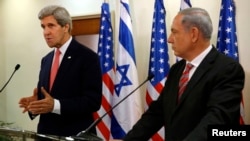JERUSALEM —
U.S. Secretary of State John Kerry says Israeli security tops the Obama administration's agenda in international efforts to limit Iran's nuclear program.
Kerry said Thursday after meeting with Israeli Prime Minister Benjamin Netanyahu in Jerusalem that the United States will do everything in its power to ensure Iran's ability to create nuclear weapons is "terminated." He said both the U.S. and Israel agree on the goal of a long-term, comprehensive agreement with Iran.
"A peaceful program should not be that hard to prove, and everybody will know whether or not in the end the comprehensive agreement actually provides a test adequate to prove the peacefulness of that program," he said.
Netanyahu has been a relentless critic of last month's interim agreement to contain Iran's nuclear program, calling it an "historic mistake."
Softer tones
But in their first meeting since the deal struck in Geneva, the prime minister chose not to publicly criticize Kerry. Netanyahu said a lasting solution to what Israel sees as Iran's nuclear threat must include ending any possible development of atomic weapons.
"In the final deal, unlike the interim deal, it is crucial to bring about a final agreement about the termination of Iran's military nuclear capability," he said.
Iran says it has never sought to develop nuclear weapons and has now agreed to eliminate stockpiles of highly-enriched uranium and suspend work on a plutonium reactor in exchange for partial relief from some sanctions.
Netanyahu told reporters following his talks with Kerry that he is concerned about easing the economic pressures that brought Iran's new government to the negotiating table, saying "steps must be taken to prevent further erosion of sanctions."
Vigilance
Kerry says the international community remains "vigilant" about its sanctions regime.
"We say to any country that contemplates moving ahead of sanctions: don't," he said. "Because those sanctions will continue to be enforced."
Political directors and technical experts from the United States, Russia, France, China, Germany, and Britain are working with Iran to begin these first steps over the next six months to allow time for a more comprehensive nuclear agreement that Kerry says "can withstand everyone's test."
Earlier this week, Kerry met in Brussels with both European Union foreign policy chief Catherine Ashton and with Russian Foreign Minister Sergei Lavrov about how best to move forward on the Iranian nuclear deal.
Kerry said Thursday after meeting with Israeli Prime Minister Benjamin Netanyahu in Jerusalem that the United States will do everything in its power to ensure Iran's ability to create nuclear weapons is "terminated." He said both the U.S. and Israel agree on the goal of a long-term, comprehensive agreement with Iran.
"A peaceful program should not be that hard to prove, and everybody will know whether or not in the end the comprehensive agreement actually provides a test adequate to prove the peacefulness of that program," he said.
Netanyahu has been a relentless critic of last month's interim agreement to contain Iran's nuclear program, calling it an "historic mistake."
Softer tones
But in their first meeting since the deal struck in Geneva, the prime minister chose not to publicly criticize Kerry. Netanyahu said a lasting solution to what Israel sees as Iran's nuclear threat must include ending any possible development of atomic weapons.
"In the final deal, unlike the interim deal, it is crucial to bring about a final agreement about the termination of Iran's military nuclear capability," he said.
Iran says it has never sought to develop nuclear weapons and has now agreed to eliminate stockpiles of highly-enriched uranium and suspend work on a plutonium reactor in exchange for partial relief from some sanctions.
Netanyahu told reporters following his talks with Kerry that he is concerned about easing the economic pressures that brought Iran's new government to the negotiating table, saying "steps must be taken to prevent further erosion of sanctions."
Vigilance
Kerry says the international community remains "vigilant" about its sanctions regime.
"We say to any country that contemplates moving ahead of sanctions: don't," he said. "Because those sanctions will continue to be enforced."
Political directors and technical experts from the United States, Russia, France, China, Germany, and Britain are working with Iran to begin these first steps over the next six months to allow time for a more comprehensive nuclear agreement that Kerry says "can withstand everyone's test."
Earlier this week, Kerry met in Brussels with both European Union foreign policy chief Catherine Ashton and with Russian Foreign Minister Sergei Lavrov about how best to move forward on the Iranian nuclear deal.













